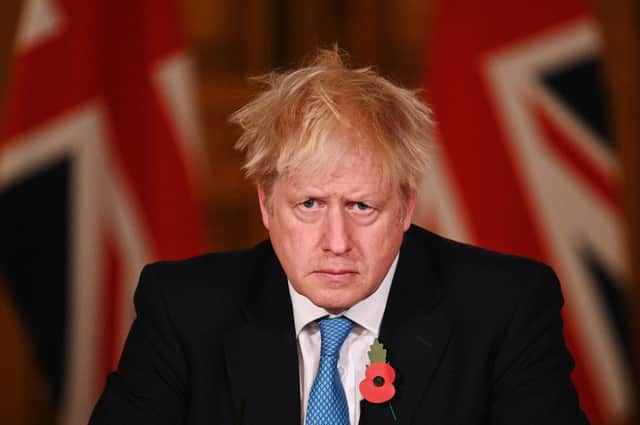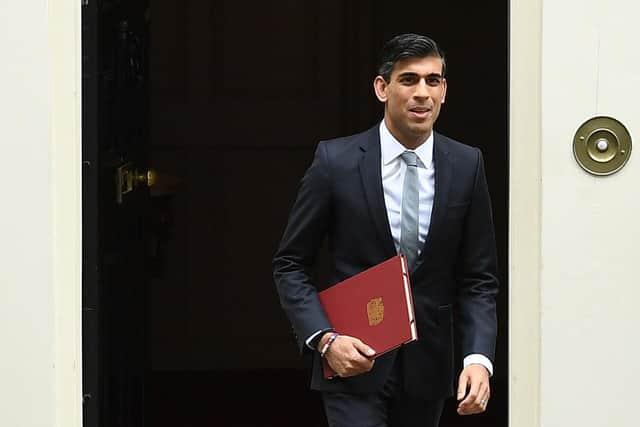If Boris Johnson doesn't want to be known as the Prime Minister of England, he should stop acting like one – Kirsty Strickland
This article contains affiliate links. We may earn a small commission on items purchased through this article, but that does not affect our editorial judgement.


Over the course of his short premiership, Boris Johnson has shown us what happens when you take a pin to an over-inflated ego.
Our Prime Minister is becoming increasingly bad-tempered. His trademark clownish persona was always rooted in insincerity, but it is telling that we’ve seen so little of it since he took office.
Advertisement
Hide AdAdvertisement
Hide AdThis is to some extent understandable. The Prime Minister is dealing with a crisis so broad in its scope and so destructive in its consequences, that it’s no surprise that his blustering Boris alter-ego has been retired for the time being.
Mr Johnson is said to still be suffering the effects of his own battle with coronavirus. His friends say he isn’t enjoying being Prime Minister all that much, despite it being a job he has always wanted. He complains that his income has dropped since he took office. He is thoroughly fed-up.
Big List of Mortal Enemies
A man capable of greater introspection than Mr Johnson might, in this moment, be feeling some degree of empathy for his predecessor, and questioning his own role in bringing about her downfall.


Theresa May, despite her many foibles, understood the need to separate herself from the office she held. She didn’t take criticism personally and since leaving Number 10, she hasn’t shown any ill-will to those colleagues, such as Mr Johnson, who were so brutal in their treatment of her.
The same cannot be said of Mr Johnson. You get the impression that his Big List of Mortal Enemies is updated daily and includes mildly critical colleagues, as well as other world leaders and the Ocado delivery driver who was ten minutes late with his shopping once.
This week, former Conservative MP Rory Stewart offered his analysis of Mr Johnson. In doing so, he demonstrated why gruff, beardy Scottish journalists swooned over his every utterance during the Tory leadership contest. He said of the prime minister: “He has mastered the use of error, omission, exaggeration, diminution, equivocation and flat denial.
"He has perfected casuistry, circumlocution, false equivalence and false analogy. He is equally adept at the ironic jest, the fib and the grand lie; the weasel word and the half-truth; the hyperbolic lie, the obvious lie, and the bullshit lie – which may inadvertently be true.”
An entirely preventable row
It was these weasel words and omissions that led to the entirely preventable row over economic lockdown support for Scotland this week.
Advertisement
Hide AdAdvertisement
Hide AdMr Johnson initially batted away questions about the specifics of how the UK government would respond to Scotland entering lockdown at a different time to England.
After an infuriating display of evasiveness, we finally reached a moment of belated clarity. In response to a question from Scottish Conservative leader Douglas Ross, the Prime Minister said the furlough scheme would ‘’of course’’ be available to other parts of the UK ‘’not just now but in the future’’ if they needed it.
Nicola Sturgeon welcomed the commitment but said she did so ‘’with a necessary degree of caution’’.
‘’We haven’t yet seen any detail of what that commitment means when translated into hard practice,” she said. “And in particular, we have not yet had confirmation from the Treasury that continuation of furlough in Scotland beyond 2 December would be at the 80 per cent level.’’
Less than 24 hours later – in what is becoming something of a signature move for the UK government – the backtracking began. During an interview with Sky News, Housing Secretary Robert Jenrick appeared to contradict his boss. Mr Jenrick said it would be for the Chancellor to decide whether furlough continued beyond 2 December. ‘’It was always UK-wide and we want it to continue to be in the future. But everybody throughout the UK today can be assured that furlough at 80 per cent will be available until 2 December.’’
Living in a fever dream?
If the Prime Minister’s commitment was solid, take-it-to-the-bank, certain, you would expect a Downing St spokesperson to quickly come out and declare that Mr Jenrick had been struck down by the curse of political misspeaking. Nobody did.
Instead, we heard more self-aggrandising references to the broad shoulders of the Union and an irrelevant emphasis on the economic support Scotland had already received. Nobody repeated the Prime Minister’s commitment – even the Prime Minister wouldn’t repeat his previous commitment – and we all started to wonder if we were living in a fever dream.
On Thursday, it was left to leader-in-waiting Rishi Sunak to end the uncertainty and announce that the devolved nations would get equivalent economic support to England, should they require another nationwide lockdown.
Advertisement
Hide AdAdvertisement
Hide AdWhatever the cause of this confusion, be it ineptitude; indecision; malevolence, or a combination of all three – this row, which has dominated the news agenda in Scotland – didn’t need to happen. It is a self-inflicted wound from a government that is already bruised and battered.
A forgotten four-nations approach
A government that wasn’t so consumed by pettiness would have been definitive. A competent Prime Minister would have clocked the strategic benefit in exclaiming ‘’Of course!’’ the first time he was asked if devolved nations would be given equal support to England.
He would have used this issue to bolster his argument that the UK is a union of equals: talk is cheap, furlough is not.
Both Nicola Sturgeon and Welsh First Minister Mark Drakeford have been damning in their recent statements about Mr Johnson’s priorities.
It is clear that the four-nations approach that the UK government pursed at the start of the pandemic has been replaced with something far less constructive.
If Mr Johnson baulks at the suggestion that he is starting to look more like a Prime Minister of England than the UK, then he should really stop acting like one.
A message from the Editor:
Thank you for reading this article. We're more reliant on your support than ever as the shift in consumer habits brought about by coronavirus impacts our advertisers.
If you haven't already, please consider supporting our trusted, fact-checked journalism by taking out a digital subscription.
Comments
Want to join the conversation? Please or to comment on this article.